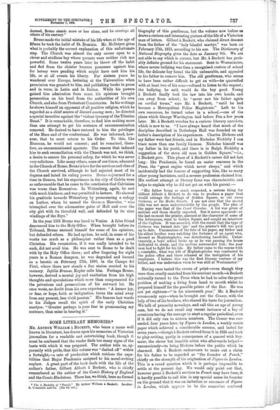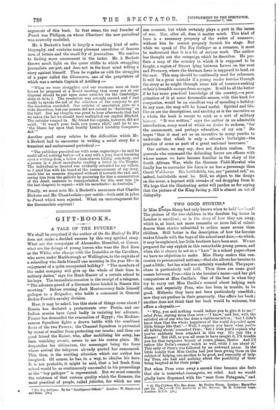SOME LITERARY MEMORIES.*
MR. ARTHUR WIIIJAht A BEcEETT, who bears a name well known in literature, has drawn upon his memories of Victorian journalism for a readable and entertaining book, though it must be confessed that the reader finds too many signs of the haste with which it was prepared. The author tells us, ap- parently with pride, that this volume was "dashed off" within a fortnight—a rate of production which outdoes the capa- bilities that Major Pendennis assigned to his novel-writing nephew. A great part of the book deals with the life of the author's father, Gilbert Abbott h Beckett, who is chiefly remembered as the author of the Comic History of England and the Comic Blackstone. There has, we think, been no formal ." The & Bocketts of "Punch." By Arthur William I Beckett. London: A. Constable and Co. [12s 6d. net.]
biography of this gentleman, but the volume now before us draws a curious and interesting picture of the life of a Victorian man of letters. Gilbert I Beckett, who claimed direct descent from the father of the "holy blissful martyr," was born on February 17th, 1811, according to his son. The Dictionary of National Biography gives the date as January 9th. We are not able to say which is correct, but Mr. h Beckett has prob- ably definite ground for his statement. Sent to Westminster, where severe bullying was then a recognised custom of school life, the delicate boy found the life unbearable, and appealed to his father to remove him. The old gentleman, who seems to have been rather difficult to get on with—he quarrelled with at least two of his sons—refused to listen to the request ; the bullying, he said, would do the boy good. Young Beckett finally took the law into his own hands, and ran away from school ; he "never saw his father again on cordial terms," says Mr. h Beckett, "until he had become a Metropolitan Police Magistrate." Left to his own resources, he turned usher in a school,—one of the plans which George Warrington laid before Pen a few years later. Mr. b. Beckett vouches for a curious literary anecdote, which is new to us. "I have always heard that much of the discipline described in Dotheboys Hall was founded on my father's description of his experiences. Charles Dickens and my father were fast friends, and in Nicholas Nickleby I can trace more than one family likeness. Nicholas himself was my father in his youth, and there is in Ralph Nickleby a suggestion of the stern old man in Golden Square,"—i.e., it Beckett pere. This phase of a Beckett's career did not last long : like Pendennis, he found an easier resource in the Press, the "great engine which never sleeps," and which incidentally had the honour of supporting him, like so many other young barristers, until a severer profession claimed him. His earliest attempt at literary fame was characteristic, and helps to explain why he did not get on with his parent :—
" His father being so much respected, a serious thing for Gilbert Abbott A. Beckett to do was to produce a paper that would outrage the feelings of Golden Square, so out came Cerberus, or the Hades Gazette. I am not sure that the second title was not more understandable by the people. The plan of the paper was that of the Court Circular. A list was given of arrivals and those shortly expected. But it never appeared—at the last moment the printer, alarmed at the character of some of the letterpress, went to Golden Square and sought an interview of the Captain. It was accorded, with the result that the type of Cerberus was turned into 'pie' and the printer's bill was paid up to date. Unconscious of the fate of his paper, my father and his eldest brother were watching the fortunes of an agent who, dressed as Mephistopheles, was distributing handbills. Unfor- tunately, a boys' school broke up as he was passing the house dedicated to study, and the urchins surrounded him: the poor man had to fight for his life. My father came to the rescue with a constable; what was left of Mephistopheles was conducted to the police office and there released at the instigation of his employers. I believe this was the first literary venture of my father, and was undertaken when he was still at Westminster."
Having once tasted the sweets of print—even though they were thus cruelly snatched from his esurient mouth-1 Beckett naturally turned to the Press when he had to solve the great problem of making a living from hand to mouth whilst he prepared himself for the possible prizes of the Bar. He was not yet eighteen—" in his nineteenth year," Mr. 1 Beckett erroneously says—when be brought out the Censor, with the help of two of his brothers, who shared his taste for journalism. We talk of precocity nowadays, and call this an age of young men, but we do not recall any recent instance of a boy of seventeen having the courage to start a regular periodical, even if it did only run to sixteen numbers. The Censor was suc- ceeded, four years later, by Figaro in London, a weekly comic
paper which achieved a considerable success, and lasted for seven years,—though ii. Beckett retired from it in 1834 and took to play-writing, partly in consequence of a quarrel with Sey- mour, the clever but irascible artist who afterwards helped- unconsciously—to bring Dickens before the public which he charmed. Mr. a Beckett endeavours to make out a claim for his father to be regarded as "the founder of Punch," chiefly on the strength of his origination of Figaro in London. This is a vexed question which it is perhaps impossible to settle at the present day. We would only point out that, however great h Beckett's services to Punch may have been, it is hardly possible to call him in any special sense its founder on the ground that it was an imitation or successor of Figaro in London, which appears to be the somewhat confused argument of this book. In that sense, the real founder of Punch was Philipon, on whose Charivari the new periodical was avowedly modelled.
Mr. l Beckett's book is largely a rambling kind of auto- biography, and contains many pleasant anecdotes of famous men of letters and the small fry of journalism. We confess to finding more amusement in the latter. Mr. it Beckett throws much light on the queer shifts to which struggling journalists are put, and does not in the least mind telling a story against himself. Thus he regales us with the struggles of a paper called the Glowworm, one of the proprietors of which was a certain Captain of Artillery :—
" When we were struggling and our resources were at their lowest he proposed at a Board meeting that every son at our disposal should be put upon some outsider for the Cambridge- shire at 50 to 1. The resolution was actually carried, and I had really to invoke the aid of the solicitors of the company to get the resolution rescinded. Our articles of association gave us a wide discretion, but our powers did not extend to fluttering' on the turf. But my chagrin was great to hear afterwards that had we taken the bet we should have multiplied our capital fiftyfold. The outsider romped in. My friend the captain, however, did not exult. It wasn't your fault, you young idiot,' said he to me, the blame lay upon that beastly Limited Liability Companies Act.'" Another good story relates to the difficulties which Mr. h Beckett had to encounter in writing a aerial story for a transient and embarrassed periodical :— " The publisher provided me with some engravings—he said he could afford nothing better—of a man with a long beard breaking open a writing-desk, a fellow clean-shaven killing somebody, and a person in a short moustache reading a letter in the Tropics. The individual so treated was evidently intended for my villain, so I used him with his beard at the commencement of my story, made him an assassin disguised without it towards the end, and, saving him from the gallows by procuring for him a commutation of the death sentence to transportation for life, sent him (in the last chapter) to repent—with his moustache—in Australia."
Finally, we must note Mr. ii, Beckett's assurance that Charles Dickens and Mr. Chamberlain—par nobile—both sent in jokes to Punch which were rejected. What an encouragement for the disconsolate aspirant!































































 Previous page
Previous page